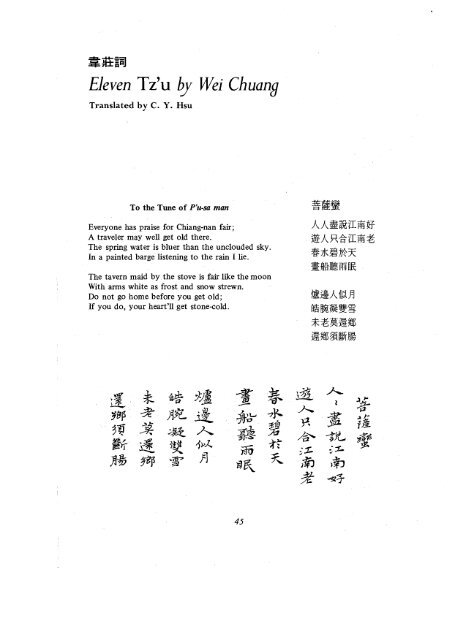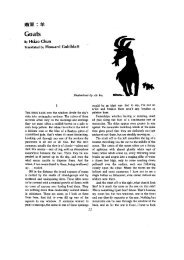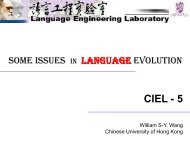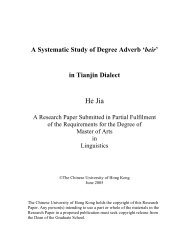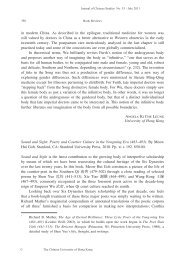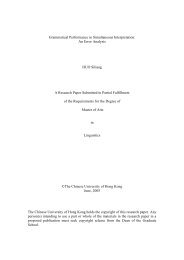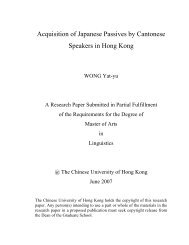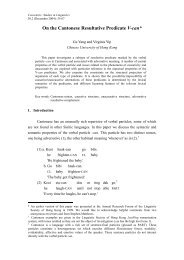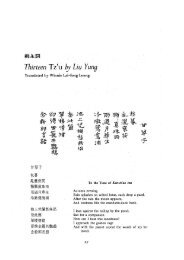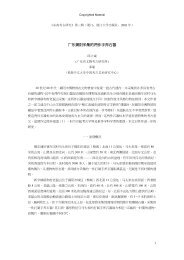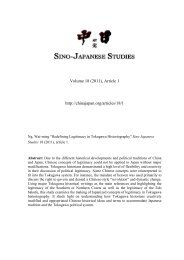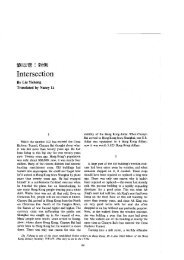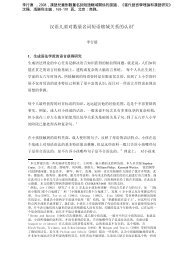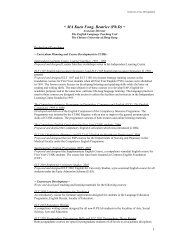Eleven Tz'u by Wei Chuang
Eleven Tz'u by Wei Chuang
Eleven Tz'u by Wei Chuang
Create successful ePaper yourself
Turn your PDF publications into a flip-book with our unique Google optimized e-Paper software.
<strong>Eleven</strong> <strong>Tz'u</strong> <strong>by</strong> <strong>Wei</strong> <strong>Chuang</strong><br />
Translated <strong>by</strong> C. Y. Hsu<br />
To the Tune of P'u-sa man<br />
Everyone has praise for Chiang-nan fair;<br />
A traveler may well get old there.<br />
The spring water is bluer than the unclouded sky.<br />
In a painted barge listening to the rain I lie.<br />
The tavern maid <strong>by</strong> the stove is fair like the moon<br />
With arms white as frost and snow strewn.<br />
Do not go home before you get old;<br />
If you do, your heart'll get stone-cold.
To the Tune of Ho-yeh pei<br />
RENDITIONS 1979<br />
I recall that year under flowers blooming<br />
Late at night<br />
The fair one and I had the first meeting.<br />
In the water pavilion behind the west screen hang-<br />
ing low<br />
Hand in hand we secretly pledged our vow.<br />
At the orioles' first warbling under a waning moon<br />
We lamentably parted.<br />
Since then, we haven't met again, late or soon.<br />
Now we are both strangers in different regions;<br />
Far less pretense is there for reunions.
<strong>Wei</strong> <strong>Chuang</strong><br />
To the Tune of Nu ,kuan tzu<br />
At midnight last night<br />
I distinctly saw you in a dream<br />
And talked with you in delight.<br />
You've the same peach-blossom face,<br />
Lowering your eyebrows like willow leaves,<br />
Showing both coyness and happy grace,<br />
Starting to go and yet lingering.<br />
On waking up I realized it was a dream.<br />
Deep sorrow keeps me agonizing.
To the Tune of P'u-sa man<br />
RENDITIONS 1979<br />
I now recall Chiang-nan's days of delight:<br />
Young I was, wearing a spring dress light.<br />
On an arched bridge I was on horse back resting<br />
When I saw on a tower red sleeves beckoning.<br />
Behind a kingfisher blue screen with golden<br />
Hinges in a flowery boudoir I slumbered drunken.<br />
This time if flower-like beauties come in sight,<br />
I won't go home till my hair turns white.
<strong>Wei</strong> Chuung<br />
To the Tune of P'u-sa man<br />
Parting at night in the red chamber evoked melan-<br />
choly<br />
With lamplight upon the half-lifted tasseled<br />
canopy.<br />
As I sadly stepped outdoors under a moon waning,<br />
The fair lady bade me farewell with tears stream-<br />
ing.<br />
The pi-pa with a kingfisher feather plectrum<br />
Issued on its strings an oriole's warble blithesome,<br />
Urging me to come home without delaying an hour<br />
For at the green casement she waits, beautiful like<br />
a flower.
To the Tune of Huan hsi sha<br />
RENDITIONS 1979<br />
Night after night I pine till the watches wane.<br />
wcB8iq~~ In grief I stand at the balustrade under moonlight<br />
And think you imagine me freezing in my quilt of<br />
lK%%EBsB<br />
brocade.<br />
%@%+AE%<br />
The small painted hall is deep as the main.<br />
When I think of you I take out your letters to<br />
recite.<br />
When may we hand in hand into Ch'ang-an pro-<br />
menade?
<strong>Wei</strong> <strong>Chuang</strong><br />
To the Tune of Huan hsi sha<br />
I wish to mount the swing but my limbs are<br />
languid.<br />
To ask someone to give me a push I'm too timid.<br />
'Twas windy and moonlit outside the hall, painted<br />
and tapestried.<br />
On such a night what lover wouldn't yearn deeply?<br />
O'er the wall the snowy pear blossoms are lovely.<br />
My pallid comely face blushes slightly.
To the Tune of Ho-yeh pei<br />
RENDITIONS 1979<br />
Rare indeed is a supreme beauty,<br />
State-toppling,<br />
Dateless for a tryst under flowers comely.<br />
Her twin eyebrows like distant hills<br />
Are too sad to bear more musings on ills.<br />
Behind a blue screen with golden phoenixes un-<br />
folded<br />
A dream wanes.<br />
The silk-curtained painted hall is deserted.<br />
No message can reach the trackless azure skies.<br />
In the old chamber sorrow ever lies.
<strong>Wei</strong> <strong>Chuang</strong><br />
To the Tune of Nu kuan tzu<br />
'Twas exactly a year ago today<br />
-The seventeenth of the fourth moon-<br />
When I saw you off on a long way.<br />
I held back tears, bowing my head<br />
And looked shy and half-frowning.<br />
Not knowing my soul already dead,<br />
I vainly followed you in dream.<br />
Nobody knew the secret in my heart<br />
Save the moon on the horizon agleam.
To the Tune of P'u-sa man<br />
RENDITIONS 1979<br />
Friend, drink tonight till aglow;<br />
With a jug in hand talk not about tomorrow.<br />
Cherish the host's hearty generosity;<br />
Equally deep are his wine and hospitality.<br />
Mind the brevity of the spring night;<br />
Complain not about the fullness of the goblet<br />
bright.<br />
With wine in hand laugh and cavort<br />
For life is after all short.
<strong>Wei</strong> <strong>Chuang</strong><br />
To the Tune of P'u-sa man<br />
Spring in Lo-yang is bright and fair<br />
But the scholar of Lo-yang is aging elsewhere.<br />
The shady willows on Prince <strong>Wei</strong>'s embankment<br />
Charm my palpitating heart to utter bewilderment.<br />
Peach blossoms on the green waters of spring<br />
Float with mandarin ducks bathing and frolicking.<br />
I gaze at the evening glow<br />
And think of you but you won't know.
<strong>Wei</strong> <strong>Chuang</strong><br />
RENDITIONS 1979<br />
As one of the pioneering tz'u poets, <strong>Wei</strong> <strong>Chuang</strong> tEE (836?-910) set<br />
the pace for this literary genre, which flowered in the Sung dynasty (960-<br />
1279). His tz'u poems, some 53 in number, are noted for simplicity and<br />
beauty of diction, naturalness and elegance of style, and poignancy in the<br />
expression of love, separation and remembrance of the past.<br />
<strong>Wei</strong>, born in Tu-ling near Ch'ang-an, came from a poor family but he<br />
was very studious and intelligent when young. In 880 he went to Ch'angan<br />
to take the Imperial examinations. But he was trapped there when the<br />
rebel Huang Ch'ao %& (died 884) took the capital and devastated the<br />
country. In 882 when Huang Ch'ao was defeated he escaped from Ch'angan<br />
to Lo-yang.<br />
In 883 while in Lo-yang he wrote Ch'in-fi-yin %Be (Ballad of the<br />
Lady of Ch'in), numbering 1,666 characters, one of the longest Chinese<br />
poems. It is a realistic poem describing the disturbance and devastation<br />
of the time through the lips of a woman refugee. <strong>Wei</strong> gained such popularity<br />
for this poem that he was nicknamed Ch'in-fu-yin hsiu-tsai SE<br />
e%2.<br />
But because of certain remarks in the poem critical of the nobility<br />
he later suppressed it and it was not included in his collection of poems<br />
Hun-hua-chi EX% compiled <strong>by</strong> his brother in 903. It had been lost for<br />
more than a thousand years until it was rediscovered among the manu-<br />
scripts at a Tun-huang grotto in 1899.<br />
In the same year when he wrote Ch'in-fu-yin <strong>Wei</strong> traveled to Chiang-<br />
nan or south of the Yangtze River. In 893 he returned to Ch'ang-an to<br />
take the examinations and in the following year he won the hsiu-tsai<br />
degree and served in the court of the T'ang Emperor Chao Tsung ES. In<br />
897 he was sent as an emissary to the principality of Shu (now Szechwan)<br />
and in 901 he went there a second time to become the secretary of Prince<br />
Wang Chien E@ (died 9 18). An admirer of the earlier T'ang poet Tu Fu<br />
$kE (7 12-770), he found in 902 the site of his dilapidated house in<br />
Cheng-tu and built a cottage on it. After the fall of T'ang in 907, Prince<br />
Wang Chien established an independent kingdom in Shu 33 and ascended<br />
the throne as Emperor of the Earlier Shu State. <strong>Wei</strong> assisted in the enact-<br />
ment of laws, statutes and institutions and rose to become the Prime<br />
Minister. He passed away in Cheng-tu in 9 10.


